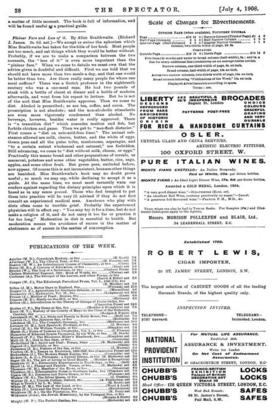Plains,. Fare and Less of it. By Alice Braithwaite. (Richard
J. James. 35. exl. net.)—We accept ex animo the aphorism which Miss Braithwaite has taken for the title of her book. Most people eat too much, and eat things which they would be better without. Probably, if we are to make a comparison between the two counsels, the "less of it" is even more important than the "plainer fare." When we come to details we must own that the advice given is doubtful and difficult. First we are told that we should not have more than two meals a day, and that one would be better than two. Are there really many people for whom one meal suffices ? There was a Scotch professor in the eighteenth century who was a one-meal man. He had two pounds of steak with a bottle of claret at dinner and a bottle of madeira afterwards, and went from his repast to lecture. But he is not of the sort that Miss Braithwaite approves. Then we come to diet. Alcohol is proscribed ; so are tea, coffee, and cocoa. The proscription is not absolute ; and the non-alcoholic stimulants are even more vigorously condemned than alcohol. No beverage, however, besides water is really approved. There is "a transition diet" which concedes mutton and fish, but forbids chicken and game. Then we get to "non-flesh dietaries." First comes a "diet on uric-acid-free lines." The animal sub- stances allowed are milk, cheese, butter, and the white of eggs. Green peas and all the pulse tribe, mushrooms, asparagus, and "to a certain extent wholemeal and oatmeal," are forbidden. Still advancing, -we come to "diet without milk, cheese, or eggs." Practically this means bread and other preparations of cereals, as macaroni, potatoes and some other vegetables, butter, rice, sago, apples, and some other fruit. But green peas, excluded before, now appear. Of course this is not inconsistent, because other things are banished. Miss Braithwaite's book may no doubt prove useful ; so much we may say, while declining to accept it as a guide. At the same time, we must most earnestly warn our readers against regarding the dietary principles upon which it is based as in any sense proved. Those who feel tempted to put them into practice will be very ill advised if they do not first consult an experienced medical man. Amateurs who play with diets often come to terrible grief. Probably the experienced physician will in effect say : "You may try it for a time, but do not make a religion of it, and do not carry it too far or practise it for too long." Moderation in diet is essential to health. But moderation means the avoidance of excess in the matter of abstinence as of excess in the matter of consumption.


















































 Previous page
Previous page